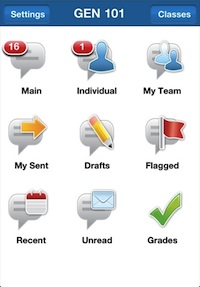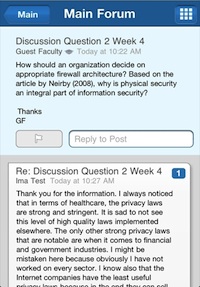U Phoenix Takes Classes onto iOS
- By Dian Schaffhauser
- 04/28/11
University of Phoenix owner Apollo Group has released PhoenixMobile, an app that will allow students with iPhone and iPod touch devices to participate in class activities on the go.
The free app lets users respond in online classroom discussions, view announcements, upload homework, and receive alerts when grades are posted or the instructor publishes new content.
"We're using technology to make education more personalized, more social, and more accessible than ever," said CTO Michael White. "The majority of our students are working learners--balancing school along with job and family responsibilities--and they do most of their school work in the online classroom between 9 p.m. and 2 a.m. Our new PhoenixMobile provides them with more options, more balance, and a better learning experience."

| | 
|
| PhoenixMobile for iOS lets students participate in discussions, check grades, and upload homework. Versions for Android and BlackBerry are also in the works. |
University President Bill Pepicello noted that nearly three out of every four college students have other areas of focus in their lives, including careers and raising families.
"For busy students who are juggling work, life and school, the PhoenixMobile app makes it easier to be present and engaged wherever and whenever it is convenient for them," he said.
The university reported that it isn't supporting installation on the iPad, although the app will work on the tablet device. U Phoenix said it will also release versions of the app for Google Android and RIM BlackBerry devices later in 2011.
About the Author
Dian Schaffhauser is a former senior contributing editor for 1105 Media's education publications THE Journal, Campus Technology and Spaces4Learning.